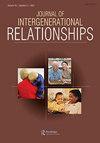Intergenerational Service Learning within an Aging Course and Its Impact on Undergraduate Students’ Attitudes about Aging
IF 1
Q3 GERONTOLOGY
引用次数: 5
Abstract
ABSTRACT Ageism is a term used to describe negative stereotypes and prejudices often leading to the discrimination of older adults. Ageism has been linked to negative outcomes such as a decreased quality of life, discrimination in the workplace, and poorer mental and physical health for older adults. Promoting positive contact experiences between older and younger generations in combination with education about aging has shown to improve attitudes among younger adults toward aging. Using the Positive Education about Aging and Contact Experiences (PEACE) model, this study examined the attitudes toward aging among 23 undergraduate students prior to and upon completion of an intergenerational service learning project, embedded within an aging course. The Fraboni Scale of Ageism (FSA) was used to measure levels of ageism before and after the intergenerational service learning project. The overall mean among the entire sample for the pre-FSA scores (68.86 ± 1.47) was significantly greater than the mean scores on the post-FSA scores (63.13 ± 1.48), t = 5.584, p < .001, demonstrating a significant decrease in ageism scores upon completion of the intergenerational service learning project. Findings validate the utility of intergenerational service learning programs and offers advice on the implementation of evidence-based strategies aimed at reducing ageism among the population.老龄化课程中的代际服务学习及其对大学生老龄化态度的影响
摘要:老年主义是一个用来描述负面刻板印象和偏见的术语,这些刻板印象和成见往往会导致对老年人的歧视。老年主义与负面结果有关,如生活质量下降、工作场所歧视以及老年人身心健康状况较差。促进老年人和年轻一代之间的积极接触体验,并结合老龄化教育,已表明可以改善年轻人对老龄化的态度。本研究采用老龄化与接触体验积极教育(PEACE)模型,调查了23名本科生在完成老龄化课程中的代际服务学习项目前后对老龄化的态度。Fraboni年龄歧视量表(FSA)用于衡量代际服务学习项目前后的年龄歧视水平。整个样本中FSA前得分的总体平均值(68.86±1.47)显著大于FSA后得分的平均值(63.13±1.48),t=5.584,p<.001,表明代际服务学习项目完成后年龄歧视得分显著降低。研究结果验证了代际服务学习计划的效用,并为实施旨在减少人口年龄歧视的循证战略提供了建议。
本文章由计算机程序翻译,如有差异,请以英文原文为准。
求助全文
约1分钟内获得全文
求助全文
来源期刊

Journal of Intergenerational Relationships
GERONTOLOGY-
CiteScore
2.80
自引率
14.30%
发文量
31
期刊介绍:
The Journal of Intergenerational Relationships is the forum for scholars, practitioners, policy makers, educators, and advocates to stay abreast of the latest intergenerational research, practice methods and policy initiatives. This is the only journal focusing on the intergenerational field integrating practical, theoretical, empirical, familial, and policy perspectives.
 求助内容:
求助内容: 应助结果提醒方式:
应助结果提醒方式:


